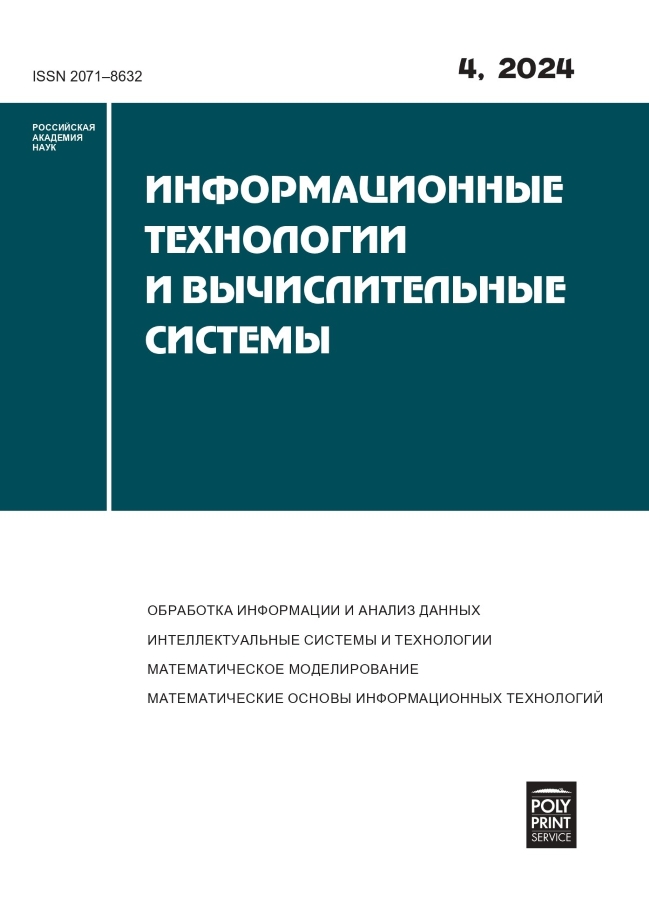Development of a Multi-Aspect Ontology for Decision Support in Production Systems
- Authors: Shilov N.G.1
-
Affiliations:
- St. Petersburg Federal Research Center of the Russian Academy of Sciences
- Issue: No 2 (2024)
- Pages: 52-64
- Section: Information processing and data analysis
- URL: https://journals.rcsi.science/2071-8632/article/view/288002
- DOI: https://doi.org/10.14357/20718632240205
- EDN: https://elibrary.ru/MVPWUM
- ID: 288002
Cite item
Abstract
Development of new data-driven concepts based on artificial intelligence methods leads to the appearance of new approaches to decision support in production systems aimed at increasing their efficiency. However, the use of existing uncoordinated data and knowledge to improve the quality of decision-making processes remains a challenging task due to the diversity of their terminologies and cognitive models. The paper proposes an approach to development of a multi-aspect ontology for decision support in production maintenance. The multi-aspect ontology is based on a layered approach to integrating knowledge about various aspects of a complex problem domain (its constituents or subdomains) while preserving the autonomy of the original ontologies. The developed multi-aspect ontology supports interaction between aspects using inference mechanisms what increases the efficiency of in- formation flows and the degree of automation of related processes. The given example shows that the proposed approach can significantly reduce the involvement of human workers in maintenance pro- cesses in an enterprise, as well as the cognitive load on operators and maintenance technicians.
About the authors
Nikolay G. Shilov
St. Petersburg Federal Research Center of the Russian Academy of Sciences
Author for correspondence.
Email: nick@iias.spb.su
PhD
Russian Federation, St. PetersburgReferences
- Kumar R., Sangwan K.S., Herrmann C., Thakur S. A cyber physical production system framework for online monitoring, visualization and control by using cloud, fog, and edge computing technologies. International Journal of Computer Integrated Manufacturing. 2023;36(10):1507-1525. doi: 10.1080/0951192X.2023.2189312
- Ansari F. Knowledge Management 4.0: Theoretical and Practical Considerations in Cyber Physical Production Systems. IFAC-PapersOnLine. 2019;52(13):1597–1602. doi: 10.1016/j.ifacol.2019.11.428
- European Commission: New European InteroperabilityFramework: Promoting seamless services and data flows for European public administrations; 2017. Available from: https://ec.europa.eu/isa2/sites/isa/files/eif_brochure_fi- nal.pdf [Accessed 13 March 2024].
- Hafidi M.M., Djezzar M., Hemam M., Amara F.Z., Maimour M.: Semantic web and machine learning techniques addressing semantic interoperability in Industry 4.0. Inter- national Journal of Web Information Systems. 2023;19:157–172. doi: 10.1108/IJWIS-03-2023-0046
- Ataeva O.M., Kalenov N.E., Serebryakov V.A. Ontological approach to the description of a common digital space of scientific knowledge. Russian Digital Libraries Journal. 2021;24(1):3–19. doi: 10.26907/1562-5419-2021-24-1-3-
- (In Russ.).
- Dorodnykh N.O., Nikolaychuk O.A., Yurin A.Yu. Using ontological content patterns in knowledge base engineering for maintenance and repair of aviation equipment. Ontology of Designing. 2022;12(2):158–171. doi: 10.18287/2223- 9537-2022-12-2-158-171. (In Russ.).
- Gruber T.R. A translation approach to portable ontology specifications. Knowledge Acquisition. 1993;5(2):199–
- doi: 10.1006/knac.1993.1008
- Semenova V.A., Smirnov S.V. Models and methods of ontological data analysis in the problem of structural analysis and synthesis of technical decisions. Ontology of Designing. 2023; 13(4):531–547. doi: 10.18287/2223-
- -2023-13-4-531-547. (In Russ.).
- Gribova V.V., Parshkova S.V., Fedorischev L.A. Ontologies for development and generation adaptive user interfaces of knowledge base editors. Ontology of Designing. 2022; 12(2):200–217. doi: 10.18287/2223-9537-2022-
- -2-200-217. (In. Russ.).
- Kudryavtsev D.V., Gavrilova T.A., Smirnova M.M., Golovacheva K.S. Building Ontology of Consumer Knowledge in Marketing: Cross-Disciplinary Approach.Artificial Intelligence and Decision Making. 2021; 3:19–32. doi: 10.14357/20718594210302. (In Russ.).
- Bader S.R., Grangel-Gonzalez I., Nanjappa P., Vidal M.-E., Maleshkova M. A Knowledge Graph for Industry 4.0. Lecture Notes in Computer Science. 2020;12123:465–480. doi: 10.1007/978-3-030-49461-2_27
- Shakhnov V.A., Averyanikhin A.E., Vlasov A.I., Zhuravleva L.V., Zinchenko L.A. Nanotechnology Knowledge Representation in Information Systems. Information Tech- nologies and Control Systems. 2014;3: 89–96. (In Russ.).
- Borgest N.М. Ontology of designing a scientific direction: formation, development, examples. Ontology of designing. 2022; 12(2):136–157. doi: 10.18287/2223-9537-2022-12-2-136-157. (In Russ.).
- El Zaatari S., Marei M., Li W., Usman Z. Cobot program- ming for collaborative industrial tasks: An overview. Robotics and Autonomous Systems. 2019;116:162–180. doi: 10.1016/j.robot.2019.03.003
- Kumar V.R.S. et al. Ontologies for Industry 4.0. Knowledge Engineering Review. 2019;34:e17. doi: 10.1017/S0269888919000109
- Meriem H., Nora H., Samir O. Predictive Maintenance for Smart Industrial Systems: A Roadmap. Procedia Computer Science. 2023;220:645–650. doi: 10.1016/j.procs.2023.03.082
- Zagorulko Yu.A. Automation of the development of ontologies of scientific subject domains based on ontology design patterns. Ontology of Designing. 2021;11(4):500–520. doi: 10.18287/2223-9537-2021-11-4-500-520. (In Russ.).
- Lim S.C.J., Liu Y., Lee W.B. A methodology for building a semantically annotated multi-faceted ontology for product family modelling. Advanced Engineering Informatics. 2011;25(2): 147–161. doi: 10.1016/j.aei.2010.07.005
- Karray M.H., Chebel-Morello B., Zerhouni N. A formal on- tology for industrial maintenance. Applied Ontology. 2012;7(3):269–310. doi: 10.3233/AO-2012-0112
- Cruz I.F., Xiao H. Ontology Driven Data Integration in Het- erogeneous Networks. In: Complex Systems in Knowledge-based Environments: Theory, Models and Ap- plications. Studies in Computational Intelligence. Springer; 2009. p. 75–98. doi: 10.1007/978-3-540-88075-2_4
- Quinton C., Haderer N., Rouvoy R., Duchien L. Towards multi-cloud configurations using feature models and ontologies. In: Proceedings of the 2013 international workshop on Multi-cloud applications and federated clouds - Mul- tiCloud ’13. ACM Press. 2013; p. 21. doi: 10.1145/2462326.2462332
- Hemam M., Boufaïda Z. MVP-OWL: a multi-viewpoints ontology language for the Semantic International Journal of Reasoning-based Intelligent Systems. 2011;3(3/4):147. doi: 10.1504/IJRIS.2011.043539
- Fernández-López M., Gómez-Pérez A. Overview and analysis of methodologies for building ontologies. Knowledge Engineering Review. 2002;17(2):129–156. doi: 10.1017/S0269888902000462
- Noy N.F., McGuinnnes D.L. Ontology Development 101: A Guide to Creating Your First Ontology. 2001. 25 p.
- Khoroshevsky V.F. Ontology Driven Software Engineering: Models, Methods, Implementations. Ontology of Desuigning. 2019;9(4):429–448. doi: 10.18287/2223- 9537-2019-9-4-429-448,. (In Russ.).
- Smirnov A., Levashova T., Ponomarev A., Shilov N. Methodology for Multi-Aspect Ontology Development: Ontology for Decision Support Based on Human-Machine Col- lective Intelligence. IEEE Access. 2021;9:135167–135185. doi: 10.1109/ACCESS.2021.3116870
- Fiorini S.R. et al. Extensions to the core ontology for robot- ics and automation. Robot. Robotics and Computer Integrated Manufacturing. 2015;33:3–11. doi: 10.1016/j.rcim.2014.08.004
- Giustozzi F., Saunier J., Zanni-Merk C. Context Modeling for Industry 4.0: an Ontology-Based Proposal. Procedia Computer Science. 2018;126:675–684. doi: 10.1016/j.procs.2018.08.001
- SD3 - Simulation Delivery and Documentation Deviations. Available from: http://aber-owl.net/ontology/SD3 [Accessed 13 March 2024].
Supplementary files










